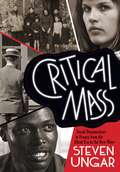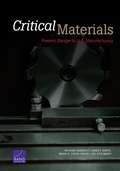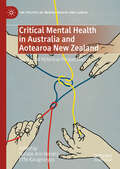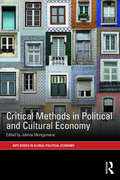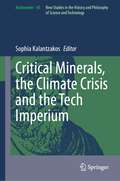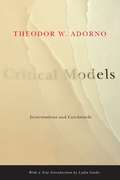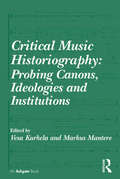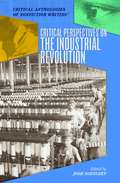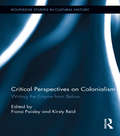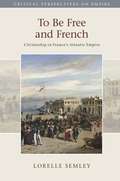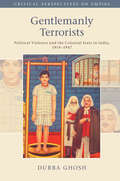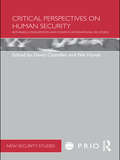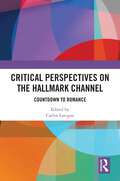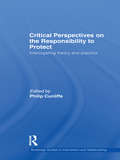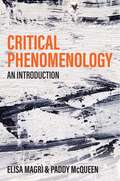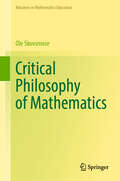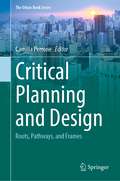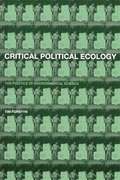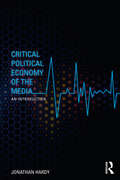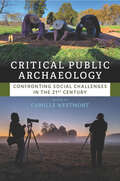- Table View
- List View
Critical Mass: Social Documentary in France from the Silent Era to the New Wave
by Steven UngarThirty-five years of nonfiction films offer a unique lens on twentieth-century French social issuesCritical Mass is the first sustained study to trace the origins of social documentary filmmaking in France back to the late 1920s. Steven Ungar argues that socially engaged nonfiction cinema produced in France between 1945 and 1963 can be seen as a delayed response to what filmmaker Jean Vigo referred to in 1930 as a social cinema whose documented point of view would open the eyes of spectators to provocative subjects of the moment.Ungar identifies Vigo&’s manifesto, his 1930 short À propos de Nice, and late silent-era films by Georges Lacombe, Boris Kaufman, André Sauvage, and Marcel Carné as antecedents of postwar documentaries by Eli Lotar, René Vautier, Alain Resnais, Chris Marker, and Jean Rouch, associated with critiques of colonialism and modernization in Fourth and early Fifth Republic France. Close readings of individual films alternate with transitions to address transnational practices as well as state- and industry-wide reforms between 1935 and 1960. Critical Mass is an indispensable complement to studies of nonfiction film in France, from Georges Lacombe&’s La Zone (1928) to Chris Marker&’s Le Joli Mai (1963).
Critical Materials: Present Danger to U.S. Manufacturing
by Richard Silberglitt James T. Bartis Brian G. Chow David L. An Kyle BradyThis report describes the results of a study of the sources and reliability of the supply of imported materials on which United States manufacturers are dependent.
Critical Mental Health in Australia and Aotearoa New Zealand: Social and Historical Perspectives (The Politics of Mental Health and Illness)
by Effie Karageorgos Natalie Ann HendryThis interdisciplinary volume examines the social production of mental health and illness in Australia and Aotearoa (New Zealand). It draws together cutting-edge critical mental health scholarship from the region, to interrogate how personal, community, institutional and mediated relations, make and remake experiences of ‘mental health.’ In the wake of the widespread insertion of psy-considerations into everyday lives, here contributors demonstrate how the relations between communities, practices, professionals and institutions often replicate long-standing histories of discrimination and violence motivated by psychiatric classification, even as the psy-disciplines move into supposedly more transformational domains: digital technology, schooling, human resources, and social media, for example. The book’s chapters reflect the current diversity within academic studies of mental health and illness in Australia and Aotearoa. This includes a wide range of case studies from war trauma in the Australian military and pornography addiction, to the depathologisation of trans health and peer workers in mental health services. Critical Mental Health in Australia and Aotearoa New Zealand offers unique insights particular to the region, to students and scholars of critical psychology, history, sociology, medical humanities, and education.
Critical Methods in Political and Cultural Economy
by Johnna MontgomerieCritical Methods in Political and Cultural Economy offers students and scholars the first methods book for the critical school of International Political Economy (IPE). What does it mean to ‘do’ critical research? How do we write about the evidence we present? This volume explores our shared critical ethic to demonstrate how methods are transformative and reimagines research strategies as both an embodied practice and a social process. By presenting methodologically informed ways of researching, enriched by real-life accounts from academics doing empirical research, the volume seeks to forge a new collaborative path that builds a critical ethic and modes of inquiry within International Political Economy. Substantive chapters advance the pluralism of the critical school of cultural political economy and seek to articulate its nascent research ethic. Short autobiographical vignettes articulate the professional journeys of contributors who ‘do’ critical political economy. There is practical advice on how to develop evidence from an iterative reflexive research strategy. Using this innovative format offers a guide to methods in critical political economy by engaging directly with the people doing research, not only as technical practice but also as lived experience. The combination of research and practice presented throughout the book offers an extensive and authoritative framework for evaluating how methods are part of critical research and will be essential reading for all students and scholars of IPE.
Critical Minerals, the Climate Crisis and the Tech Imperium (Archimedes #65)
by Sophia KalantzakosThis book examines the latest manifestations of resource competition. The energy transition and the digitalization of the global economy are both accelerating even as geopolitics driven by Sino-American hyper-competition become increasingly contentious. The volume brings together an interdisciplinary group of scholars, policy makers, institutional stakeholders, and industry experts to analyze not only the transition itself, but also the implications that the need for uninterrupted access to unprecedented levels of raw materials generates. By framing the challenges ahead for global society, governance, industry, international power politics, and the environment, the book asks hard questions about the choices that need to be made to reach net zero by mid-century. Moreover, it sheds light on different facets of the growing risks to what have been global interdependent supply chains in a way that is nuanced, balanced, and practical, thus pushing back on some of the most sensational headlines that breed confusion and may lead policymakers to make more narrow and less effective decisions. The volume is an outcome of “Rich Rocks, the Climate Crisis and the Tech-imperium” a Summer Institute at Caltech and the Huntington that took place in July 2021.
Critical Models: Interventions and Catchwords
by Theodor W. Adorno Henry W. PickfordCritical Models combines into a single volume two of Adorno's most important postwar works -- Interventions: Nine Critical Models (1963) and Catchwords: Critical Models II (1969). Written after his return to Germany in 1949, the articles, essays, and radio talks included in this volume speak to the pressing political, cultural, and philosophical concerns of the postwar era.
Critical Music Historiography: Probing Canons, Ideologies and Institutions
by Markus Mantere Vesa KurkelaDuring the past two decades, there has emerged a growing need to reconsider the objects, axioms and perspectives of writing music history. A certain suspicion towards Francois Lyotard’s grand narratives, as a sign of what he diagnosed as our ’postmodern condition’, has become more or less an established and unquestioned point of departure among historians. This suspicion, at its most extreme, has led to a radical conclusion of the ’end of history’ in the work of postmodern scholars such as Jean Baudrillard and Francis Fukuyama. The contributors to Critical Music Historiography take a step back and argue that the radical view of the ’impossibility of history’, as well as the unavoidable ideology of any history, are counter-productive points of departure for historical scholarship. It is argued that metanarratives in history are still possible and welcome, even if their limitations are acknowledged. Foucault, Lyotard and others should be taken into account but systematized viewpoints and methods for a more critical and multi-faceted re-evaluation of the past through research are needed. As to the metanarratives of music history, they must avoid the pitfalls of evolutionism, hagiography, and teleology, all hallmarks of traditional historiography. In this volume the contributors put these methods and principles into practice. The chapters tackle under-researched and non-conventional domains of music history as well as rethinking older historiographical concepts such as orientalism and nationalism, and consequently introduce new concepts such as occidentalism and transnationalism. The volume is a challenging collection of work that stakes out a unique territory for itself among the growing body of work on critical music history.
Critical Perspectives On The Industrial Revolution (Critical Anthologies Of Nonfiction Writing)
by Josh SakolskyAs modern man's greatest growth spurt, the Industrial Revolution ushered in an era unsurpassed in the history of the modern world, from technology to industry to migration. Using an eclectic group of viewpoints including presidential addresses, anonymous testimony, and the perspectives of such figures as Jack London, H.G. Wells, and Henry Ford, this title seeks to understand the scope, origin, and effects of the Industrial Revolution. The reader is drawn into a time and place that is still affecting the world today.
Critical Perspectives on Applied Theatre
by Helen Nicholson Hughes, Jenny and Nicholson, Helen Jenny HughesAs the twenty-first century moves towards its third decade, applied theatre is being shaped by contemporary economic and environmental concerns and is contributing to new conceptual paradigms that influence the ways in which socially engaged art is produced and understood. This collection offers fresh perspectives on the aesthetics, politics and histories of applied theatre. With contributions from leading scholars in the field, the book illuminates theatre in a diverse range of global contexts and regions. Divided into three sections - histories and cultural memories; place, community and environment; and poetics and participation - the chapters interweave cutting-edge theoretical insights with examples of innovative creative practice that traverse different places, spaces and times. Essential reading for researchers and artists working within applied theatre, this collection will also be of interest to those in theatre and performance studies, education, cultural policy, social history and cultural geography.
Critical Perspectives on Colonialism: Writing the Empire from Below (Routledge Studies in Cultural History)
by Fiona Paisley Kirsty ReidThis collection brings much-needed focus to the vibrancy and vitality of minority and marginal writing about empire, and to their implications as expressions of embodied contact between imperial power and those negotiating its consequences from "below." The chapters explore how less powerful and less privileged actors in metropolitan and colonial societies within the British Empire have made use of the written word and of the power of speech, public performance, and street politics. This book breaks new ground by combining work about marginalized figures from within Britain as well as counterparts in the colonies, ranging from published sources such as indigenous newspapers to ordinary and everyday writings including diaries, letters, petitions, ballads, suicide notes, and more. Each chapter engages with the methodological implications of working with everyday scribblings and asks what these alternate modernities and histories mean for the larger critique of the "imperial archive" that has shaped much of the most interesting writing on empire in the past decade.
Critical Perspectives on Empire: Citizenship in France's Atlantic Empire (Critical Perspectives on Empire)
by Lorelle SemleyThe Haitian Revolution may have galvanized subjects of French empire in the Americas and Africa struggling to define freedom and 'Frenchness' for themselves, but Lorelle Semley reveals that this event was just one moment in a longer struggle of women and men of colour for rights under the French colonial regime. Through political activism ranging from armed struggle to literary expression, these colonial subjects challenged and exploited promises in French Republican rhetoric that should have contradicted the continued use of slavery in the Americas and the introduction of exploitative labour in the colonisation of Africa. They defined an alternative French citizenship, which recognised difference, particularly race, as part of a 'universal' French identity. Spanning Atlantic port cities in Haiti, Senegal, Martinique, Benin, and France, this book is a major contribution to scholarship on citizenship, race, empire, and gender, and it sheds new light on debates around human rights and immigration in contemporary France.
Critical Perspectives on Empire: Colonial Relations
by Perry AdeleA study of the lived history of nineteenth-century British imperialism through the lives of one extended family in North America, the Caribbean and the United Kingdom. The prominent colonial governor James Douglas was born in 1803 in what is now Guyana, probably to a free woman of colour and an itinerant Scottish father. In the North American fur-trade, he married Amelia Connolly, the daughter of a Cree mother and an Irish-Canadian father. Adele Perry traces their family and friends over the course of the 'long' nineteenth-century, using careful archival research to offer an analysis of the imperial world that is at once intimate and critical, wide-ranging and sharply focused. Perry engages feminist scholarship on gender and intimacy, critical analyses about colonial archives, transnational and postcolonial history and the 'new imperial history' to suggest how this period might be rethought through one powerful family located at the British Empire's margins.
Critical Perspectives on Empire: Decolonisation and the Pacific
by Tracey Banivanua MarThis book charts the previously untold story of decolonisation in the oceanic world of the Pacific, Australia and New Zealand, presenting it both as an indigenous and an international phenomenon. Tracey Banivanua Mar reveals how the inherent limits of decolonisation were laid bare by the historical peculiarities of colonialism in the region, and demonstrates the way imperial powers conceived of decolonisation as a new form of imperialism. She shows how Indigenous peoples responded to these limits by developing rich intellectual, political and cultural networks transcending colonial and national borders, with localised traditions of protest and dialogue connected to the global ferment of the twentieth century. The individual stories told here shed new light on the forces that shaped twentieth-century global history, and reconfigure the history of decolonisation, presenting it not as an historic event, but as a fragile, contingent and ongoing process continuing well into the postcolonial era.
Critical Perspectives on Empire: Imperial Underworld
by Kirsten MckenzieDuring a major overhaul of British imperial policy following the Napoleonic Wars, an escaped convict reinvented himself as an improbable activist, renowned for his exposés of government misconduct and corruption in the Cape Colony and New South Wales. Charting scandals unleashed by the man known variously as Alexander Loe Kaye and William Edwards, Imperial Underworld offers a radical new account of the legal, constitutional and administrative transformations that unfolded during the British colonial order of the 1820s. In a narrative rife with daring jail breaks, infamous agents provocateurs, and allegations of sexual deviance, Professor Kirsten McKenzie argues that such colourful and salacious aspects of colonial administrations cannot be separated from the real business of political and social change. The book instead highlights the importance of taking gossip, paranoia, factional infighting and political spin seriously to show the extent to which ostensibly marginal figures and events influenced the transformation of the nineteenth-century British Empire.
Critical Perspectives on Empire: Political Violence and the Colonial State in India, 1919–1947 (Critical Perspectives on Empire)
by Durba GhoshIn Gentlemanly Terrorists, Durba Ghosh uncovers the critical place of revolutionary terrorism in the colonial and postcolonial history of modern India. She reveals how so-called 'Bhadralok dacoits' used assassinations, bomb attacks, and armed robberies to accelerate the departure of the British from India and how, in response, the colonial government effectively declared a state of emergency, suspending the rule of law and detaining hundreds of suspected terrorists. She charts how each measure of constitutional reform to expand Indian representation in 1919 and 1935 was accompanied by emergency legislation to suppress political activism by those considered a threat to the security of the state. Repressive legislation became increasingly seen as a necessary condition to British attempts to promote civic society and liberal governance in India. By placing political violence at the center of India's campaigns to win independence, this book reveals how terrorism shaped the modern nation-state in India.
Critical Perspectives on Human Security: Rethinking Emancipation and Power in International Relations (PRIO New Security Studies)
by David ChandlerThis new book presents critical approaches towards Human Security, which has become one of the key areas for policy and academic debate within Security Studies and IR. The Human Security paradigm has had considerable significance for academics, policy-makers and practitioners. Under the rubric of Human Security, security policy practices seem to have transformed their goals and approaches, re-prioritising economic and social welfare issues that were marginal to the state-based geo-political rivalries of the Cold War era. Human Security has reflected and reinforced the reconceptualisation of international security, both broadening and deepening it, and, in so doing, it has helped extend and shape the space within which security concerns inform international policy practices. However, in its wider use, Human Security has become an amorphous and unclear political concept, seen by some as progressive and radical and by others as tainted by association with the imposition of neo-liberal practices and values on non-Western spaces or as legitimizing attacks on Iraq and Afghanistan. This book is concerned with critical perspectives towards Human Security, highlighting some of the tensions which can emerge between critical perspectives which discursively radicalise Human Security within frameworks of emancipatory possibility and those which attempt to deconstruct Human Security within the framework of an externally imposed attempt to regulate and order the globe on behalf of hegemonic power. The chapters gathered in this edited collection represent a range of critical approaches which bring together alternative understandings of human security. This book will be of great interest to students of human security studies and critical security studies, war and conflict studies and international relations.
Critical Perspectives on the Hallmark Channel: Countdown to Romance
by Carlen LavigneThis multinational, multidisciplinary collection of essays focuses on Hallmark Channel movies and Hallmark’s position in the changing North American media landscape.This book covers the ‘Countdown to Christmas’ offerings, year-round productions, made-for-TV mysteries and romances, Hallmark’s use of specific filming locations, and its relationship to viewer desires. Chapters examine Hallmark’s position in a changing sociopolitical context and the tensions the company must navigate in creating more “progressive” content; they discuss issues of gender, race, sexuality, and place, as well as analyzing the extensive ranges and reactions of social media participants and interrogating the nature of Hallmark’s popularity.Suitable for scholars and students of film and tv and popular culture studies, this is a multifaceted look at both Hallmark and its viewers at a particular moment of Hallmark’s market dominance.
Critical Perspectives on the Responsibility to Protect: Interrogating Theory and Practice (Routledge Studies in Intervention and Statebuilding)
by Philip CunliffeThis edited volume critically examines the widely supported doctrine of the 'Responsibility to Protect', and investigates the claim that it embodies progressive values in international politics. Since the United Nations World Summit of 2005, a remarkable consensus has emerged in support of the doctrine of the ‘responsibility to protect’ (R2P) – the idea that states and the international community bear a joint duty to protect peoples around the world from mass atrocities. While there has been plenty of discussion over how this doctrine can best be implemented, there has been no systematic criticism of the principles underlying R2P. This volume is the first critically to interrogate both the theoretical principles and the policy consequences of this doctrine. The authors in this collection argue that the doctrine of R2P does not in fact embody progressive values, and they explore the possibility that the R2P may undermine political accountability within states and international peace between them. This volume not only advances a novel set of arguments, but will also spur debate by offering views that are seldom heard in discussions of R2P. The aim of the volume is to bring a range of criticisms to bear from a variety of disciplinary perspectives, including international law, political science, IR theory and security studies. This book will be of much interest to students of the Responsibility to Protect, humanitarian intervention, human security, critical security studies and IR in general.
Critical Phenomenology: An Introduction
by Paddy McQueen Elisa MagrìPhenomenology is one of the leading movements in twentieth-century philosophy and continues to exert a strong influence on many contemporary philosophical traditions and investigations. In recent years, phenomenological insights have been increasingly developed in relation to philosophy of illness, disability, race, gender, sexuality, and politics, leading to the emergence of critical phenomenology as a new, prominent field for interdisciplinary research. Magrì and McQueen's Critical Phenomenology: An Introduction is the first book of its kind, addressing the critical questions at the core of both classical and contemporary phenomenology. This book provides a concise, accessible introduction to key areas of phenomenological research, such as intersubjectivity, bodily experience, race, gender, social experience, and political action. In doing so, it demonstrates both the rich history of phenomenology and its continuing philosophical and ethical importance. This textbook will be essential reading for undergraduate philosophy students and academics interested in critical phenomenology.
Critical Philosophy of Mathematics (Advances in Mathematics Education #15)
by Ole SkovsmoseThis book provides a philosophy of mathematics that resonates with critical mathematics education. It draws attention to the social complexities that characterise the period of Modernity including the extreme exploitation of manual workers and their families, brutal forms of colonisations, trading of slaves, and the formation of racist ideologies. It portrays Modernity as a period of contradictions and highlights that mathematics is a part of these contradictions. The text interprets mathematics as being indefinite, seeing that mathematics is a part of the ongoing human constructions. It outlines a performative interpretation of mathematics, portraying mathematics as intrinsically connected to actions. Any kind of action, including mathematics-based actions, calls for ethical considerations and this leads to any mathematical practice, either in research, application, or education, to face ethical challenges. It illustrates with examples how a critical philosophy of mathematics can come to be an integral part of classroom practices.
Critical Planning and Design: Roots, Pathways, and Frames (The Urban Book Series)
by Camilla PerroneThe book interprets and recombines, within a subjective trajectory, some roots, pathways and conceptual frames of the planning thought that worked either as dissenting imaginations or generative source to critically question the modernist epistemologies. ‘Critical planning and design’ is presented in this book as a field of research inspired by critical urban theory and developed along with ideas and theories that prove to be radical, alternative, dialectical to the mainstream history of planning.In this book, scholars present what they consider as the most important books in the field of planning, public policy and design. They have been asked to write about a book and its author, in their preferred manner. This freedom allowed passionate and original contributions.Three main threads - the three parts of the book - shape the choices of the authors. The first concerns the reconstruction of some genealogical roots of planning (including Cerdà, Yona Friedman, Alberto Magnaghi, and Ian McHarg). The second thread groups the authors who dialogue with contemporary protagonists of the planning debate (including John Friedmann, Leonie Sandercock, Doreen Massey, David Harvey, Tom Sievert, and Patzy Healey). The third thread includes authors who dig into relevant writings in social and philosophical sciences (including Max Weber, Charles Lindblom, Henri Lefebvre, Gilles Deleuze & Félix Guattari, Georges Didi-Huberman, Robert Nozick, Pand hilip K Dick).The book is addressed to researchers of planning and urban studies, who value the critical re-reading of some fundamental books. Including thoughtful and critical arguments on influential thinkers of the past two centuries, the book will enable students, scholars and researchers of planning, design, political science, geographical, environmental, and urban studies to better understand the socio-spatial and ecological transformations under the contemporary transition while relying on a “usable past”. The book is also addressed to a wider audience of readers interested in the problems of the city and space.
Critical Political Ecology: The Politics of Environmental Science
by Timothy ForsythCritical Political Ecology brings political debate to the science of ecology. As political controversies multiply over the science underlying environmental debates, there is an increasing need to understand the relationship between environmental science and politics. In this timely and wide-ranging volume, Tim Forsyth uses an innovative approach to apply political analysis to ecology, and demonstrates how more politicised approaches to science can be used in environmental decision-making.Critical Political Ecology examines:*how social and political factors frame environmental science, and how science in turn shapes politics*how new thinking in philosophy and sociology of science can provide fresh insights into the biophysical causes and impacts of environmental problems*how policy and decision-makers can acknowledge the political influences on science and achieve more effective public participation and governance.
Critical Political Economy of the Media: An Introduction (Communication and Society)
by Jonathan HardyHow the media are organised and funded is central to understanding their role in society. Critical Political Economy of the Media provides a clear, comprehensive and insightful introduction to the political economic analysis of contemporary media. Jonathan Hardy undertakes a critical survey of political economy scholarship encompassing worldwide literature, issues and debates, and relationships with other academic approaches. He assesses different ways of making sense of media convergence and digitalisation, media power and influence, and transformations across communication markets. Many of the problems of the media that prompted critical political economy research remain salient, he argues, but the approach must continue to adapt to new conditions and challenges. Hardy advances the case for a revitalised critical media studies for the 21st century. Topics covered include: media ownership and financing news and entertainment convergence and the Internet media globalisation advertising and media alternative media media policy and regulation Introducing key concepts and research, this book explains how political economy can assist students, researchers and citizens to investigate and address vital questions about the media today.
Critical Public Archaeology: Confronting Social Challenges in the 21st Century
by V. Camille WestmontCritical approaches to public archaeology have been in use since the 1980s, however only recently have archaeologists begun using critical theory in conjunction with public archaeology to challenge dominant narratives of the past. This volume brings together current work on the theory and practice of critical public archaeology from Europe and the United States to illustrate the ways that implementing critical approaches can introduce new understandings of the past and reveal new insights on the present. Contributors to this volume explore public perceptions of museum interpretations as well as public archaeology projects related to changing perceptions of immigration, the working classes, and race.
Critical Public Archaeology: Confronting Social Challenges in the 21st Century
by V. Camille WestmontCritical approaches to public archaeology have been in use since the 1980s, however only recently have archaeologists begun using critical theory in conjunction with public archaeology to challenge dominant narratives of the past. This volume brings together current work on the theory and practice of critical public archaeology from Europe and the United States to illustrate the ways that implementing critical approaches can introduce new understandings of the past and reveal new insights on the present. Contributors to this volume explore public perceptions of museum interpretations as well as public archaeology projects related to changing perceptions of immigration, the working classes, and race.
